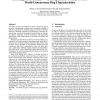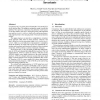24 search results - page 1 / 5 » Tolerating Concurrency Bugs Using Transactions as Lifeguards |
MICRO
2010
IEEE
13 years 2 months ago
2010
IEEE
Abstract--Parallel programming is hard, because it is impractical to test all possible thread interleavings. One promising approach to improve a multi-threaded program's relia...
ASPLOS
2012
ACM
12 years 6 days ago
2012
ACM
Multithreaded programs often suffer from synchronization bugs such as atomicity violations and deadlocks. These bugs arise from complicated locking strategies and ad hoc synchroni...
ASPLOS
2008
ACM
13 years 6 months ago
2008
ACM
The reality of multi-core hardware has made concurrent programs pervasive. Unfortunately, writing correct concurrent programs is difficult. Addressing this challenge requires adva...
SOSP
2007
ACM
14 years 1 months ago
2007
ACM
This paper describes the design, implementation, and evaluation of a replication scheme to handle Byzantine faults in transaction processing database systems. The scheme compares ...
ASPLOS
2006
ACM
13 years 10 months ago
2006
ACM
Concurrency bugs are among the most difficult to test and diagnose of all software bugs. The multicore technology trend worsens this problem. Most previous concurrency bug detect...


